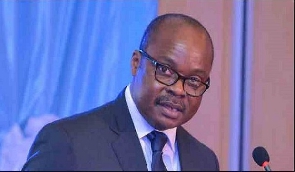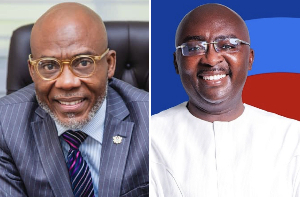Provisional data from the Bank of Ghana (BoG) for the first five months of 2019, reveals that government has again exceeded its fiscal deficit target of 2.4 percent of GDP, instead recording 3.0 percent of GDP, on cash basis.
This excludes some legacy energy-related payments of about 0.7 percent of GDP which is being treated outside of the budgetary balance just as the fiscal deficit incurred in cleaning the banking sector last year was done.
Explaining the latest fiscal developments at the weekend the Governor of the Central Bank, Dr. Ernest Addison said, “the higher-than-projected fiscal deficit outturn was primarily driven by lower-than-expected revenues outturn against increased pace of spending. The revenue shortfalls were mainly from international trade taxes.”
Over the review period, total revenue and grants amounted to GHc 18.5 billion compared to a programmed target of GHc 21.5 billion, indicating an annual growth of 7.6 percent.
Total expenditures however reached GHc 28.6 billion. This was marginally below the target of GHc 29.7 billion indicating that government has strived to cut back its spending to compensate for the revenue shortfall. However public expenditure for the first half year showed 25.2 percent growth over the corresponding period of last year evidencing the ambitiousness of government’s spending plans for 2019. The fiscal deficit has been growing faster than planned since the beginning of the year; by March it was 1.8 percent of GDP, ahead of the target for the first quarter, of 1.6 percent of GDP.
In line with the above developments, the stock of public debt rose to GHc 200.0 billion, representing 58.1 percent of GDP, at the end of May 2019 compared with GHc 153.4 billion, representing 51.0 percent of GDP, same period in 2018.
Of the total debt stock, domestic debt was GHc 94.6 billion, or 27.5 percent of GDP, of which GHc 11.0 billion, (3.2 percent of GDP) represented bonds issued to support the financial sector clean-up while external debt was GHc 105.4 billion, representing 30.6 percent of GDP.
The central bank’s Monetary Policy Committee observed that the pace of fiscal consolidation has slowed down, mainly reflecting gaps in revenue mobilization while the pace of spending has increased. Indeed, this year’s fiscal deficit target of 4.2 percent is higher than last year’s 3.7 percent the first targeted increase in the deficit since Ghana entered a programme with the International Monetary Fund in April 2015, aimed at restoring macro-economic stability.
The BoG warned that slower than planned fiscal consolidation could pose risks to macroeconomic stability if not addressed.
The Committee anticipates that some corrective measures will be announced in the mid-year budget review, scheduled for later this month, which should help address the financing gap challenges as well as manage the risks from the large unbudgeted energy sector related payments that could adversely impact foreign exchange reserves and undermine the macro stability gains made so far.
The Committee decided to maintain the policy rate at 16 percent. This decision was based on the committee’s assessment of the situation in the light of the central bank’s core mandate of price stability, which appears to be on track. Inflation has remained within the target band in the last 15 months.
Business News of Monday, 22 July 2019
Source: goldstreetbusiness.com













